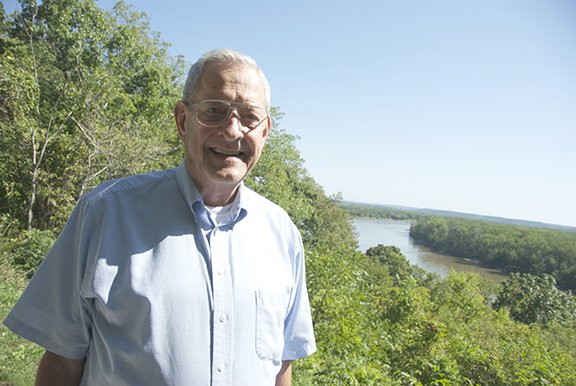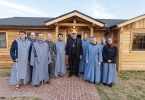
Elmer Fangman stands over the bend in the Missouri River near Benedictine College’s campus. Fangman oversaw the merger of St. Benedict’s College and Mount St. Scholastica College while he was dean of students at St. Benedict’s.
by Laurie Ghigliotti
Special to The Leaven
ATCHISON — “Elmer Fangman raised a family, saved Benedictine College during the lean years, and served the Catholic faith in a single bound,” said Father Brendan Rolling, OSB, with a chuckle.
“Thanks, Elmer,” he continued.
“You give us all something to live up to.”
Fangman takes no credit for the equanimity with which he faces both the blessings and the adversities that come his way.
“It’s a blessing of God and the grace of God to have had good parents,” he said.
“You follow the unwritten script, following what you’ve seen your parents do,” he added. “You do your best and be with other people the way your parents were.”
And so, nothing much ever seems to rattle the longtime member of St. Benedict’s Church in Atchison, who is also the former dean of Benedictine College and the father of nine children.
Fangman grew up on a Kansas farm just a few miles north of Seneca in an all-German community. One of nine siblings, he learned early on to face life’s challenges calmly and patiently, a legacy of both of his parents, but also of day-to-day life on a farm.
Growing up, Fangman prayed the rosary with his siblings and parents each day. Working on the farm together and spending Sundays after church surrounded by extended family taught lessons that he continues to draw on at the age of 77.
“I was always struck by my mother’s and father’s families,” Fangman said. “Growing up on the farm, Sundays were our day off and a time for family. Just seemed natural for family to get together on Sundays for meals, and the kids would all play together.”
‘Never a burden’
That sense of rootedness, and of family, served Fangman well in adulthood. When his daughter Patricia was born with Down syndrome, Fangman and his wife Ann faced it like any other challenge.
Born before the advent of diagnostic tests that could have prepared the Fangmans for Patricia’s condition, Patricia’s disability came as a complete surprise to the couple.
But he and Ann responded with characteristic calm and optimism.
“When Patricia was born, I didn’t know what the future would be,” said Fangman. “But I knew we’d do the best we could with the situation.”
“I think my expectation is part of what I learned from my parents,” he said. “You take what comes and do your best with it.”
That’s the legacy of growing up on a farm, believes Fangman’s daughter Colleen Hubble.
“You live with what God puts in front of you,” she said. “[My grandparents’] faith was strong because of that.”
Another daughter, Joan Schuster, remembers her youngest sister’s birth. There wasn’t any big fuss made, she said, about Patricia’s Down syndrome; her baby sister was considered a blessing.
“He and Mom never viewed her as a burden,” Schuster said. “They always saw her as a gift.”
Today, Patricia, 42, lives at home with her father and leads an active life. Fangman is obviously proud of what his daughter has been able to accomplish despite her limitations. This is her 22nd year working in a school cafeteria. She also volunteers at a local nursing home and enjoys swimming.
“She definitely has expectations of herself,” said Fangman. “She does really well. She is in charge of herself and her schedule and is able to function on her own.”
Patricia was born at a very good time, he believes.
“They were just beginning to mainstream the handicapped,” he said.
But she also benefitted from being the youngest of nine children.
“She’s learned a lot by being with her siblings,” said Fangman.
‘Voice of reason’
Fangman’s wife Ann died years ago — but not before leaving an indelible mark on their children.
“She really had a way of bringing the best out in the children,” said Fangman. “She was an example and a teacher to them. She understood the importance of home and family and communicated that to the family.”
Even now, Ann is never far away.
“She’s still here in our children,” Fangman said. “You can see it in their actions and in their characters.”
Elmer and Ann were married on May 30, 1959. Both were educated by Benedictines — Elmer by Benedictine Sisters at his parish school in St. Benedict, and then by the monks at Maur Hill Prep and St. Benedict’s College in Atchison.
Ann, a resident of Atchison, went to Atchison Catholic Elementary School, Mount St. Scholastica Academy and Mount St. Scholastica College, all Benedictine-founded institutions.
They met when Elmer was a senior at St. Benedict’s College. It was at the college in Atchison that Fangman began his professional career.
But he soon returned to school to become a guidance counselor. Then, in 1970, one year before the merger of St. Benedict’s College and Mount St. Scholastica College, he was named dean of students at St. Benedict’s.
Fangman oversaw the merger, which wasn’t accomplished without a few bumps along the way for both students and staff, said then-college president Father Gerard Senecal, OSB.
“Elmer was the voice of reason and patience,” Father Gerard said. “People like Elmer were the glue that kept things together and kept the place going.”
But that monumental change has been accompanied, over the 30-year span of his deanship, by a myriad of others.
“When I came to school, my dad got everything I needed in half the trunk of the car,” said Fangman. “Now students show up with U-Hauls.”
‘Servant leadership’
Several Benedictine College administration members were students at the college during Fangman’s tenure as dean of students, including Joe Wurtz, the current dean of students.
Wurtz has benefited from Fangman’s wisdom and example.
“Elmer Fangman personifies wisdom,” said Wurtz. “Most of my successes as a dean of students were taken directly from him. In fact, even now when I need counsel on difficult scenarios, he is the first person I call.”
Difficult situations notwithstanding, Fangman exemplifies not only wisdom, but charity.
“Not only is Elmer full of wisdom, he is full of charity,” Wurtz said. “I remember . . . when I was a resident director under Elmer and a former student had to spend the night in jail.
“Elmer called me, since [the student] was a previous resident of mine, and we went and visited him in jail to bring hope to his situation.”
“I’ll never forget Elmer’s compassion and words of encouragement to this person,” added Wurtz. “This is but one example of the thousands of students who benefitted from Elmer’s servant leadership.”
Wurtz also remembers Fangman’s creative technique for getting to the bottom of a problem with erring students.
Timothy Andrews, now executive director of alumni and donor relations at Benedictine, has only heard secondhand what Wurtz witnessed in person — that use of one the best tools in Dean Fangman’s arsenal: silence.
“He would invite the student or students under suspicion of inappropriate activity into his office,” said Andrews, “offer them a chair and then just look at them without saying a word, for a long time. He even did this sometime if he wasn’t sure they actually did anything or were the right people, which is quite amusing in its own right.
“However, most of the time he had the right people. Much more often than not, they caved under the pressure of the silence and just admitted to everything — and sometimes more.”
College president Stephen Minnis was also a student during Fangman’s time as dean.
“But he was also the father of one of my best friends, Dan, who was in my class at Benedictine,” said Minnis. “So I also saw him in the light of a wonderful husband and father. Not many of the students get to see this side of their dean, but it is a side of him that makes me grow in admiration every day when I see what wonderful people his children turned out to be.”
All of Fangman’s children attended Benedictine College. For some, it might have been awkward being the son or daughter of the dean of students.
But the confidence Fangman’s children had in him went a long way toward overcoming most of that. Fangman’s daughter Colleen recalled the time one of her friends had to meet with him.
“One of my friends actually complained that my father had yelled at her,” Colleen said. “I told her, ‘You might have not liked what he said, but I know he didn’t yell at you.’
“In the end, she had to agree.”
‘Nothing but positive’
Fangman’s gift for relating to others, along with his patience and steadfastness, has left his children and grandchildren a valuable legacy.
“He keeps us grounded,” said daughter Joan. “He was always there for us — whether we liked it or not.”
Her father’s love of family has been handed down to his children as well.
“We enjoy being with each other, and that’s probably because of our parents,” said Joan. “His whole pattern of respect and of putting others first — all of us are that way with our kids and other people.”
And those are qualities that Fangman is happy to see in his children.
“The children are all good friends with each other,” said Fangman. “And, when my wife had a stroke and it was hard for her to travel, the kids came home more often.”
Fangman credits other people with his success as a father and a counselor.
“You get a lot of good examples when you grow up in Catholic schools,” he said. “It’s just natural to do the same.”
Catholic education was important in the Fangman family. Not only did he and his wife attend Catholic schools, but so did their children. “They all went to ACES, Maur Hill, Mount St. Scholastica Academy and Benedictine College,” Fangman said.
“A good Catholic college — more than any other place — is where you see a real respect for each individual, a respect for how to treat other people,” Fangman said. “It’s the kind of thing you see in pastors, but to see it in an entire group of people like the employees at Benedictine, you’re impressed by it.”
Even at his age, Fangman continues to work part time. These days, he works as a counselor, running the anger management program at All Faith Counseling Center in Atchison, according to Cindy Whitmer, director of the center.
“What impresses me most about him is how he and his wife raised nine children and, at this time of his life, he is still caring for his youngest daughter,” said Whitmer. “I’ve never heard him complain. Nothing but positive. He is true to what he believes in.
“I hold him in high regard because of that authenticity.”
Fangman has touched a lot of lives through his work and now through his children, who seem to have inherited his life philosophy. At this point in his life, one would understand if he decided to kick back and fully retire.
But he’s not done yet.
“There’s always wanting to help people develop themselves,” he said.
In the end, his philosophy is a simple one.
“God is good,” he said.
“The world is good.
“But, there are difficulties to face.”






